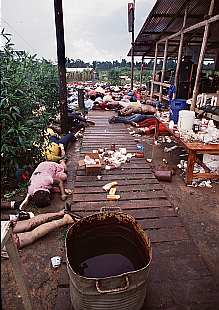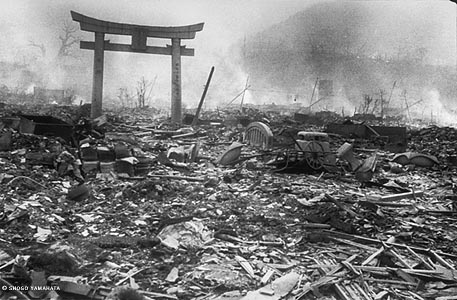Posts filed under In Memoriam
8:15 AM, August 6th, 1945. Hiroshima, Japan.
This pocket watch belonged to Kengo Nikawa, a 59-year-old civilian worker living in Hiroshima, Japan. A gift from his son, Kazuo Nikawa, the watch was one of his most precious belongings. It is stopped at 8:15 A.M., the time at which an atomic bomb exploded about 200 yards over his home-town, Hiroshima, Japan.
This is one of the artifacts featured today at Dulce Et Decorum Est: 2007-08-06, in memory of the American government’s deliberate massacre of about 140,000 civilians in Hiroshima 62 years ago today. As far as I am aware, the atomic bombing of the Hiroshima city center, which deliberately targeted a civilian center and killed over half of the people living in the city, remains the deadliest act of terrorism in the history of the world.
Further reading:
Drinking the Kool-Aid
Quick quiz. What’s wrong with this Monday’s Doonesbury?

[Mike Doonesbury and Kim are watching the news on television.]
Announcer: Today, the White House moved to further shore up its deeply unpopular war policy…
Announcer: In what is being termed
surge protection,leading GOP lawmakers were invited to a private reception.Announcer: Light refreshments were served.
[Dialogue coming from the White House.]
Bush: Another glass of Kool-Aid, Senator?
Senator: Sure, why not?
I’ve commented on this before, briefly, elsewhere. But I’ll repeat myself, because I think it’s important.
I don’t know how clearly many people remember this anymore, but the phrase drinking the Kool-Aid
entered our pop culture as a reference to the massacre at Jonestown, Guyana on November 18, 1978. Jonestown was a communal farm established in the jungle in Guyana by a preacher named Jim Jones and about 1,000 members of his People’s Temple–an interracial, evangelical church which had become a major presence in the politics and culture of the San Fransisco Bay Area after Jones and many of his followers relocated to northern California in the mid-1960s. The church’s doctrines combined charismatic religion with a radical form of socialist liberation theology, and in San Francisco Jones won praise from the city press and Leftist politicians. But within the church, Jones had grown increasingly authoritarian and paranoid as he became more powerful in the outer world, and in the late 1970s reports began to reach the press of harassment and violence against former members. After Jones and his followers relocated to Guyana, the utopian community in Jonestown soon descended into little more than a prison farm, with beatings, confinement, and torture used to keep members from leaving the community.
In November 1978, California Representative Leo Ryan traveled to Guyana with a group of reporters and concerned family members to investigate the situation at Jonestown. Several residents at Jonestown approached Ryan to beg him to take them back to the United States. On Jones’s orders, Ryan and four others were murdered at the airstrip on before they could leave, and after the murders he and his lieutenants decided to order a ritual mass suicide for everyone at Jonestown.

Jones’s lieutenants killed several of the elderly members of the congregation by injecting them with poison in their sleep. (About two-thirds of the population at Jonestown were children or senior-citizens.) After they were killed, two buckets of grape Flavor-Aid were prepared and laced with Valium and cyanide. The drink was brought into the assembly hall and passed around in paper cups. Babies and children were the first to drink, with the mixture squirted into the throats of the youngest children with a syringe. The poisoned drink caused convulsions, unconsciousness, and death within about 5 minutes. After the children died, some of the adults began to commit suicide by drinking the Flavor-Aid themselves. It is not known how many of the parents knew that the drink was poisoned before they gave it to their children; some may have killed themselves partly out of guilt after realizing that they had killed their own children. In any case, those who refused were forced to drink the poison or shot to death by armed guards.
The Guyanese authorities learned about the massacre from Jones’s legal advisers, who were not members of the Temple and did not participate. Relief workers discovered the bodies of 913 of the inhabitants lying dead in the jungle. Among the dead were 276 infants and children. The ghastly massacre is still often misleadingly referred to as a mass suicide
in the press and reference sources.
Please remember that all those punchlines and snarky little throw-away epithets about how the devotees of some cause you dislike are drinking the Kool-Aid
are actually jokes with the senseless deaths of nearly 1,000 people less than 30 years ago, for their punch-line.
Jokes like that suck.
Ending it. Stopping it. No more.
Feminists should remember that while we often don’t take ourselves very seriously, the men around us often do. I think that the way we can honor these women who were executed, for crimes that they may or may not have committed–which is to say, for political crimes–is to commit every crime for which they were executed, crimes against male supremacy, crimes against the right to rape, crimes against the male ownership of women, crimes against the male monopoly of public space and public discourse. We have to stop men from hurting women in everyday life, in ordinary life, in the home, in the bed, in the street, and in the engineering school. We have to take public power away from men whether they like it or not and no matter what they do. If we have to fight back with arms, then we have to fight back with arms. One way or another we have to disarm men. We have to be the women who stand between men and the women they want to hurt. We have to end the impunity of men, which is what they have, for hurting women in all the ways they systematically do hurt us.
–Andrea Dworkin (1990): Mass Murder in Montreal, Life and Death, 105-114.
On 6 December 1989, seventeen years ago today, Marc Lepine murdered 14 women at Montreal’s Ecole Polytechnique. He killed them because they were women; he went into an engineering class with a gun, ordered the men to leave, screamed I hate feminists
, and then opened fire on the women. He kept shooting, always at women, as he moved through the building, killing 14 women and injuring 8 before he ended the terror by killing himself.
6 December is a day of remembrance for the women who were killed. They were:
- Geneviève Bergeron, aged 21
- Hélène Colgan, 23
- Nathalie Croteau, 23
- Barbara Daigneault, 22
- Anne-Marie Edward, 21
- Maud Haviernick, 29
- Barbara Maria Klucznik, 31
- Maryse Leclair, 23
- Annie St.-Arneault, 23
- Michèle Richard, 21
- Maryse Laganière, 25
- Anne-Marie Lemay, 22
- Sonia Pelletier, 28; and
- Annie Turcotte, aged 21
GT 2004-12-06: The Montreal Massacre:
The Montreal Massacre was horrifying and shocking. But we also have to remember that it’s less unusual than we all think. Yes, it’s a terrible freak event that some madman massacred women he had never even met because of his sociopathic hatred. But every day women are raped, beaten, and killed by men–and it’s usually not by strangers, but by men they know and thought they could trust. They are attacked just because they are women–because the men who assault them believe that they have the right to control women’s lives and their sexual choices, and to hurt them or force them if they don’t agree. By conservative estimates, one out of every four women is raped or beaten by an intimate partner sometime in her life. Take a moment to think about that. How much it is. What it means for the women who are attacked. What it means for all women who live in the shadow of that threat.
Today is a day to remember fourteen innocent women who died at the hands of a self-conscious gender terrorist. Like most days of remembrance, it should also be a day of action. I mean practical action.. And I mean radical action. I mean standing up and taking concrete steps toward the end to violence against women in all of its forms. Without excuses. Without exceptions. Without limits. And without apologies. Andrea Dworkin wrote I
want to see this men’s movement make a commitment to ending rape because that is the only meaningful commitment to equality. It is astonishing that in all our worlds of feminism and antisexism we never talk seriously about ending rape. Ending it. Stopping it. No more. No more rape. In the back of our minds, are we holding on to its inevitability as the last preserve of the biological? Do we think that it is always going to exist no matter what we do? All of our political actions are lies if we don’t make a commitment to ending the practice of rape. This commitment has to be political. It has to be serious. It has to be systematic. It has to be public. It can’t be self-indulgent.
And the same is true of every form of everyday gender terrorism: stalking, battery, confinement, rape, murder. How could we face Geneviève Bergeron, Hélène Colgan, Nathalie Croteau, Barbara Daigneault, Anne-Marie Edward, Maud Haviernick, Barbara Maria Klucznik, Maryse Leclair, Annie St.-Arneault, Michèle Richard, Maryse Laganière, Anne-Marie Lemay, Sonia Pelletier, and Annie Turcotte, and tell them we did anything less?
Take some time to keep the 14 women who were killed in the Montreal massacre in your thoughts. Make a contribution to your local battered women’s shelter. As Jennifer Barrigar writes:
Every year I make a point of explaining that I’m pointing the finger at a sexist patriarchal misogynist society rather than individual men. This year I choose not to do that. The time for assigning
blameis so far in the past (if indeed there ever was such a time), and that conversation takes us nowhere. This is the time for action, for change. Remember Parliament’s 1991 enactment of the National Day of Remembrance and Action on Violence Against Women — the glorious moment when every single womyn in the House stood together and claimed this Day of Remembrance. Remember what we can and do accomplish — all of us — when we work together. It is time to demand change, and to act on that demand. Let’s break the cycle of violence, and let’s do it now.Remember. Mourn. Act.
11:02 A.M.
This is a recording of Oppenheimer (1997), by the British composer Jocelyn Pook. The voice that you hear at the beginning is Robert Oppenheimer, in an interview many years after the war, talking about his thoughts at the Trinity test
of the atomic bomb, on July 16th, 1945.


